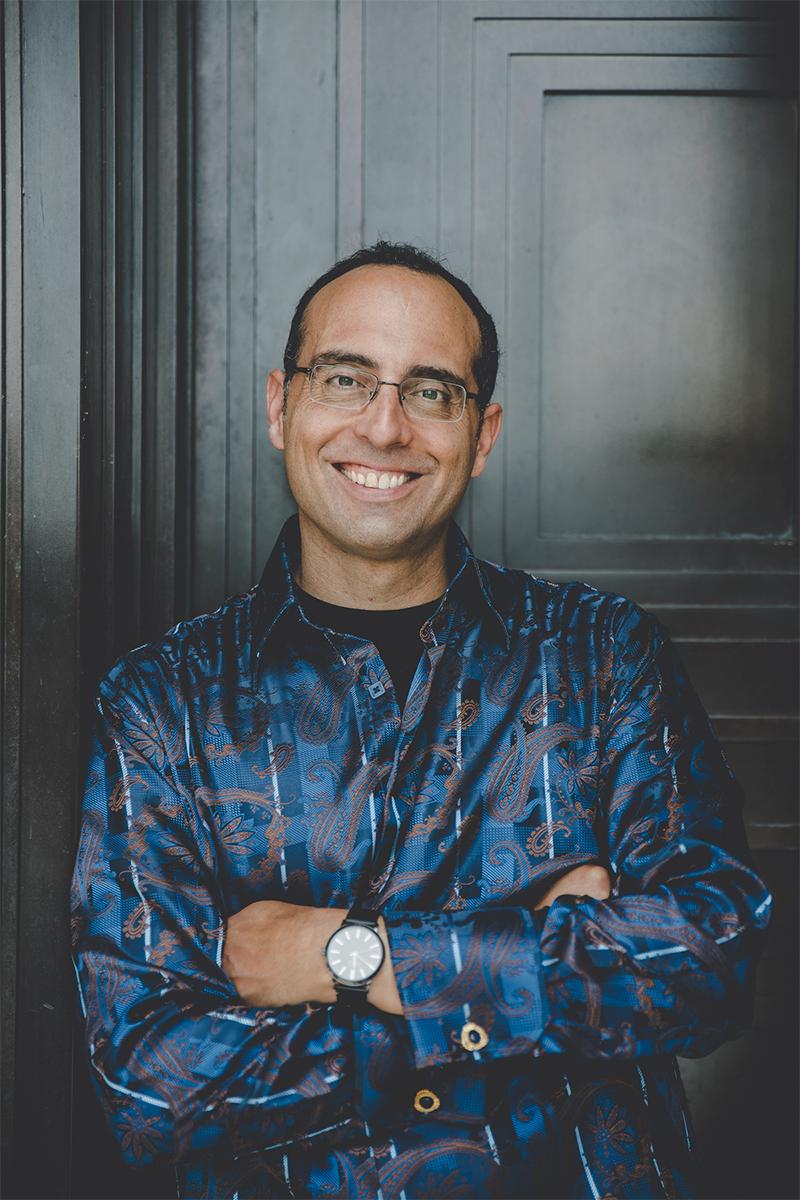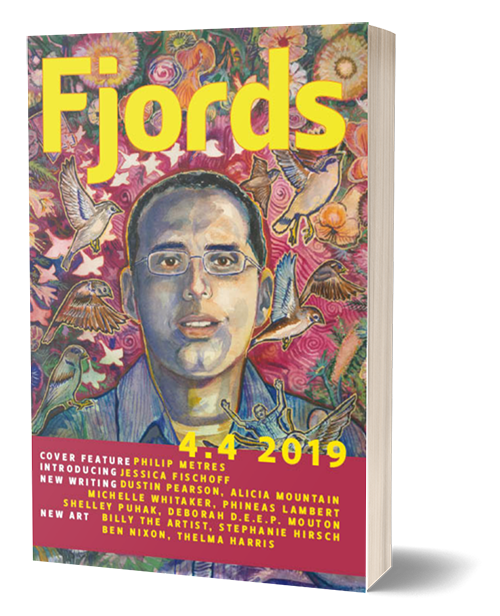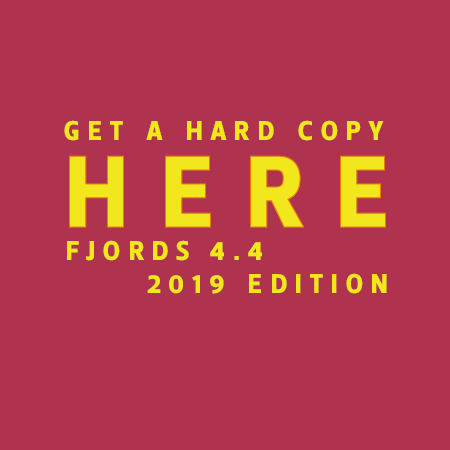April 22, 2020
A SPARROW FLYING THROUGH DOORS:
AN INTERVIEW WITH POET PHILIP METRES
by Kelly McQuain
“I wonder if gratitude is the beginning of joy,” muses poet Philip Metres, the author of ten books, including the forthcoming Shrapnel Maps (2020, Copper Canyon). “And how quickly it all seems to go,” he concedes. “The days are long, but the years are short, and they shorten with every year. As Bede writes,
‘The present life of man upon earth, O King, seems to me in comparison with that time which is unknown to us like the swift flight of a sparrow through mead-hall where you sit at supper in winter, with your Ealdormen and thanes, while the fire blazes in the midst and the hall is warmed, but the wintry storms of rain or snow are raging abroad. The sparrow, flying in at one door and immediately out at another, whilst he is within, is safe from the wintry tempest, but after a short space of fair weather, he immediately vanishes out of your sight, passing from winter to winter again. So this life of man appears for a little while, but of what is to follow or what went before we know nothing at all.’”
Metres not only finds inspiration in the 8th century words of the saintly “Father of English History,” but also in his wife and the two daughters for whom he coaches basketball. Other influences include spirituality, yoga, and the guitar, with his musical influences ranging from the Isley Brothers to Public Enemy. In terms of literary heroes, he cites such giants as Rumi, Gerard Manley Hopkins, Walt Whitman, Emily Dickinson, and Anton Chekhov, as well as rising contemporaries like Danez Smith, Solmaz Sharif, Chris(topher) Kempf, and Kaveh Akbar—new poets writing work he describes as “bolder and browner and more beautiful than I can remember.”
Metres, professor of English and director of the Peace, Justice, and Human Rights program at John Carroll University, grows bashful when asked what he hopes his own writing will change about the world. “The question is so large that I don’t feel like answering it,” he says, “lest I become an arrogant jerk or a naïve fool. Like saying I want to end American empire. Or to take off the clothes of my old self and become reborn as light.” Yet, he goes on to wonder, “What writer doesn’t want to change themselves and the world in ways large and small? I suppose I hope that my work comforts the afflicted and afflicts the comfortable, as Mother Jones once said. That it wakens us and widens us. That it becomes a waystation, a refuge for those who need a space to breathe and dream, and a conflagration for those who need to set themselves into motion. Long may it burn.”
Metres’s most recent book is The Sound of Listening (essays, 2018); other works include Pictures at an Exhibition (2016), and Sand Opera (2015), all poetry collections that have helped him garner a Lannan fellowship, two NEAs, six Ohio Arts Council Grants, the Hunt Prize, two Arab American Book Awards, and the Cleveland Arts Prize. Clearly, he keeps busy.

©Phil Metres by Heidi Rolf 2018
In fact, he finds it easier to write than to rest. When asked to describe where he writes, he confesses, “I go into myself pretty quickly, so surroundings matter very little to me. I’ve written everywhere and under all conditions. If I could sleep as easily as I enter the trance of writing, I’d be a truly happy man.” He admires his dog Flash, a black mini-poodle with a white chest. “[For Flash,] every day is the best day. He shakes off sleep and gallops to check on all members of the pack, then reminds us of our duties to liberate him to the outside. He bears no grudges. He’s fully present. He lives for the We that is the pack. He is faith and goodwill personified, and his love is total. Perhaps he is my aspirational self? This human animal is far too heavy with dreams and past and concerns.”
Metres has a propensity for bright colors and likes purple and paisley. “I love shirts that approximate 19th century drapery, that offend the J. Crew crew. I can’t help myself anymore. I also like to wear red or orange shoes—a strange flair that emerged in midlife, after spending far too long wearing serious black.” He traces this to a painful junior high experience that he’s been trying to “unwrite”. “My mom had bought me a pair of burgundy running sneakers,” he says. “On the first day that I wore them, Ted Carris, one of the cool kids, saw me as I walked in the door and said, “HEY, RED SHOES!” A few days later, my mom noticed that I wasn’t wearing them anymore. She asked why. I probably said that they were uncool or that I was teased because of them. In any case, I never wore them again. When I used to teach Emerson’s ‘Self-Reliance,’ I’d use this story as a way of talking about the difficulty of standing out. At some point, perhaps inspired by Emerson, I decided to buy some red shoes just to reclaim that part of myself that I’d lost in the process of trying to disappear. American men’s fashion (i.e. straight white men’s fashion) is, as a rule, terribly boring and dominated by duns and grays. You have to work at color.
“He sketches out his childhood as a “portrait-of-life-as-a-minimalist play trajectory: dinosaurs, then Dungeons & Dragons, and finally poetry (and other forms made of words)... Writing remains one of my ways of playing. Although I occasionally struggle as the words find their final form, I find writing mostly playful, full of abundance and strangeness, and I love seeing the words start to announce themselves on the page.”
Like many of us, Metres longs “for total peace, to come home to myself, but it’s a long journey.” He quotes spiritual leader, poet and peace activist Thich Nhat Hanh: ‘Many of us don’t want to go home to ourselves. We’re afraid…. We escape…we turn away from ourselves and don’t attend to bodies, feelings, or states of mind. We have to go home. If we’re at war with our parents, friends, society, or our church, it may be because there is a war raging within us...’”
“I am on a journey to enter into myself,” concludes Philip Metres, “which is not myself—the door to where I am and am not. Sometimes I’m moving when I’m completely still.”
1. Inspiration: Are there things you cannot live without? Are there books or authors that are essential? Are there people who inspire you? What music do you most like to dance to?
“Things that would render my life impoverished or incomplete: My family: Amy, Adele, Leila. Each of them is the world to me. My parents, brother and sister. Also: writing and reading (door to myself/world), yoga, basketball, music, nature (doors to body/world). Some songs that still shake me and wake me: ‘Eight Miles High’ by Husker Du, ‘Hum Allah Hum Allah Hum Allah’ by Phoenix Sanders, ‘Rummy’ by Spinanes, ‘It’s Your Thing’ by The Isley Brothers, ‘Holocene’ by Bon Iver, ‘Fight the Power’ by Public Enemy, (and) ‘Sweet Thing’ by Van Morrison, to name the first ones that occur to me this pre-dawn morning.”
2. Joy: What looks like joy to you? Is there a physical object or setting that evokes or symbolizes joy to you? An object corollary of some sort? What are the obstacles in this world that sometimes antagonize that joy or impede it?
“I wonder if gratitude is the beginning of joy. Just the purest sense of surprise at the crazy loveliness of existence. Isn’t it strange that we exist at all? That somehow I am my self and not nothing at all?”
“And how quickly it all seems to go. The days are long but the years are short, and they shorten with every year. As Bede writes, ‘The present life of man upon earth, O King, seems to me in comparison with that time which is unknown to us like the swift flight of a sparrow through mead-hall where you sit at supper in winter, with your Ealdormen and thanes, while the fire blazes in the midst and the hall is warmed, but the wintry storms of rain or snow are raging abroad. The sparrow, flying in at one door and immediately out at another, whilst he is within, is safe from the wintry tempest, but after a short space of fair weather, he immediately vanishes out of your sight, passing from winter to winter again. So this life of man appears for a little while, but of what is to follow or what went before we know nothing at all.’”
3. Purpose: What do you hope your writing will change about the world? What themes or ideas concern you the most? Is there a recent line from your work that embodies your sense of purpose, and can you share it?
“This question is so large that I don’t feel like answering it, lest I become an arrogant jerk or a naïve fool. Like saying I want to end American empire. Or to take off the clothes of my old self and become reborn as light.?”
“But what writer doesn’t want to change themselves and the world in ways large and small? I suppose I hope that my work comforts the afflicted and afflicts the comfortable, as Mother Jones once said. That it wakens us and widens us. That it becomes a waystation, a refuge for those who need a space to breathe and dream, and a conflagration for those who need to set themselves into motion. Long may it burn.”
4. Work: What is your favorite setting in which to write? Are there any things you surround yourself with, like pictures or physical items?
“I go into myself pretty quickly, so surroundings matter very little to me. I’ve written everywhere and under all conditions. If I could sleep as easily as I enter the trance of writing, I’d be a truly happy man.”
5. Totems, Creatures, Other Selves: If you could be an animal, what would you choose? Alternately, if you had a spirit animal or familiar, what would it be? The “animal” need not be a real animal. It could be from mythology or folklore. It could even be a monster. If you feel like telling me why you chose this thing to represent a hidden aspect of yourself, please do. If an idea doesn’t spring to mind, you might frame the question to encompass how a close friend might answer this question about you. If animals don’t work, consider other types of nonhuman things: a type of flower, a work tool, a place.
“I admire our dog Flash, a black mini-poodle with a white chest. Every day is the best day. He shakes off the sleep and gallops to check on all members of the pack, then reminds us of our duties to liberate him to the outside. He bears no grudges. He’s fully present. He lives for the ‘we’ that is the pack. He is faith and goodwill personified, and his love is total. Perhaps he is my aspirational self? This human animal is far too heavy with dreams and past and concerns.”
6. Physicality: Are there tattoos, piercings, or items of clothing that characterize your physical self?
“I’m un-illustrated and largely un-pierced (except my left earlobe). Some may know me for my propensity for purple and paisley. I love shirts that approximate 19th century drapery, that offend the J. Crew crew. I can’t help myself anymore. I also like to wear red or orange shoes. The strange flair emerged in midlife, after spending far too long wearing serious black. The red shoes stem from a painful junior high experience that I’ve been trying to unwrite. My mom had bought me a pair of burgundy running sneakers. On the first day that I wore them, Ted Carris, one of the cool kids, saw me as I walked in the door and said, “HEY, RED SHOES!” A few days later, my mom noticed that I wasn’t wearing them anymore. She asked why. I probably said that they were uncool or that I was teased because of them. In any case, I never wore them again. When I used to teach Emerson’s ‘Self-Reliance,’ I’d use this story as a way of talking about the difficulty of standing out. At some point, perhaps inspired by Emerson, I decided to buy some red shoes just to reclaim that part of myself that I’d lost in the process of trying to disappear. American men’s fashion (i.e. straight white men’s fashion) is, as a rule, terribly boring and dominated by duns and grays. You have to work at color.”
7. Heroes and Inspirations: Who are some of your heroes? This could be a superhero, a historical or literary figure, a pop culture diva, a person from your life.
“Are heroes a good thing to have? Is it a way of absolving ourselves from doing the work that we may be called to do? June Jordan: ‘We are the ones we have been waiting for.’”
“And yet I have been encouraged by so many writers before me: Rumi, Gerard Manley Hopkins, Walt Whitman, Emily Dickinson, Anton Chekhov, Leo Tolstoy, Anna Akhmatova, Gabriel García Márquez, Adrienne Rich, Gwendolyn Brooks, William Stafford, Mahmoud Darwish, June Jordan, CD Wright, Marilyn Hacker, Lawrence Joseph, Mark Nowak. So many younger poets hearten me as well: Fady Joudah, Danez Smith, Marwa Helal, Solmaz Sharif, Chris(topher) Kempf, Kaveh Akbar, George Abraham—poetry bolder and browner and more beautiful than I can remember.”
8. Play: What kind of toys did you play with as a child? Is there anything you collect now? Any hobbies or special skills? Cooking, gardening, skateboarding, etc.? Do you view writing as a sort of play or does it usually feel like hard work?
“Portrait-of-a-life-as-a-minimalist play trajectory: dinosaurs, then Dungeons & Dragons, and finally poetry (and other forms made of words). I am an inveterate basketball player (and coach for my daughters). I run, do yoga, and swim in the summer. I love to play guitar, as often as possible, and I like to embarrass myself by playing publicly now and then. Writing remains one of my ways of playing. Although I occasionally struggle as the words find their final form, I find writing mostly playful, full of abundance and strangeness, and I love seeing the words start to announce themselves on the page.”
9. Motto: Is there a favorite line of poetry or a quotation that inspires or guides you?
“‘The Lord GOD has given me a well-trained tongue, that I might know how to speak to the weary a word that will rouse them.’ Isaiah 50:4.”
10. Home: The Dutch have a term called “gezelligheid”, which is said to have no exact English translation. It’s used to evoke feelings of “coziness” or “comfort” among friends. Who or what makes you feel that way? What is your chosen family like? Alternately, what do you long for that makes you feel at home and “gezellig”? Is there a mythic or lost home that tends to exist mainly in your imagination these days?
“I long for total peace, to come home to myself, but it’s a long journey. Thich Nhat Hanh: ‘Many of us don’t want to go home to ourselves. We’re afraid. There’s a lot of internal suffering and conflict that we want to avoid. We complain that we don’t have time to live, yet we try to kill our free time by not going back to ourselves. We escape…we turn away from ourselves and don’t attend to bodies, feelings, or states of mine. We have to go home. If we’re at war with our parents, friends, society, or our church, it may be because there is a war raging within us…. With some training, with the practice of mindful walking and mindful breathing, we’ll be able to go home and embrace our pain and sorrow.’”
“I am on a journey to enter into myself, which is not myself—the door to where I am and am not. Sometimes I’m moving when I’m completely still. Gibran: ‘But you, children of space, you restless in rest, you shall not be trapped nor tamed. / Your house shall be not an anchor but a mast.’”


